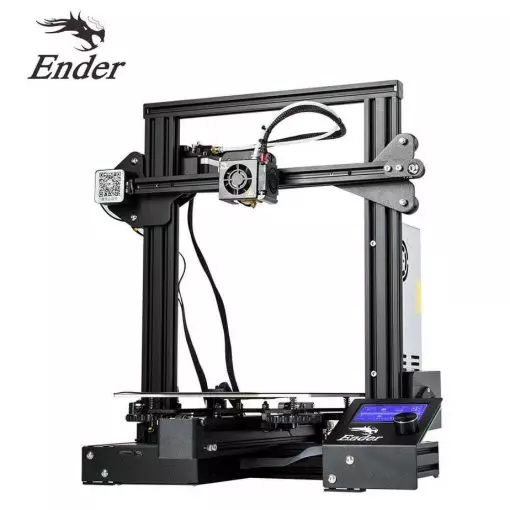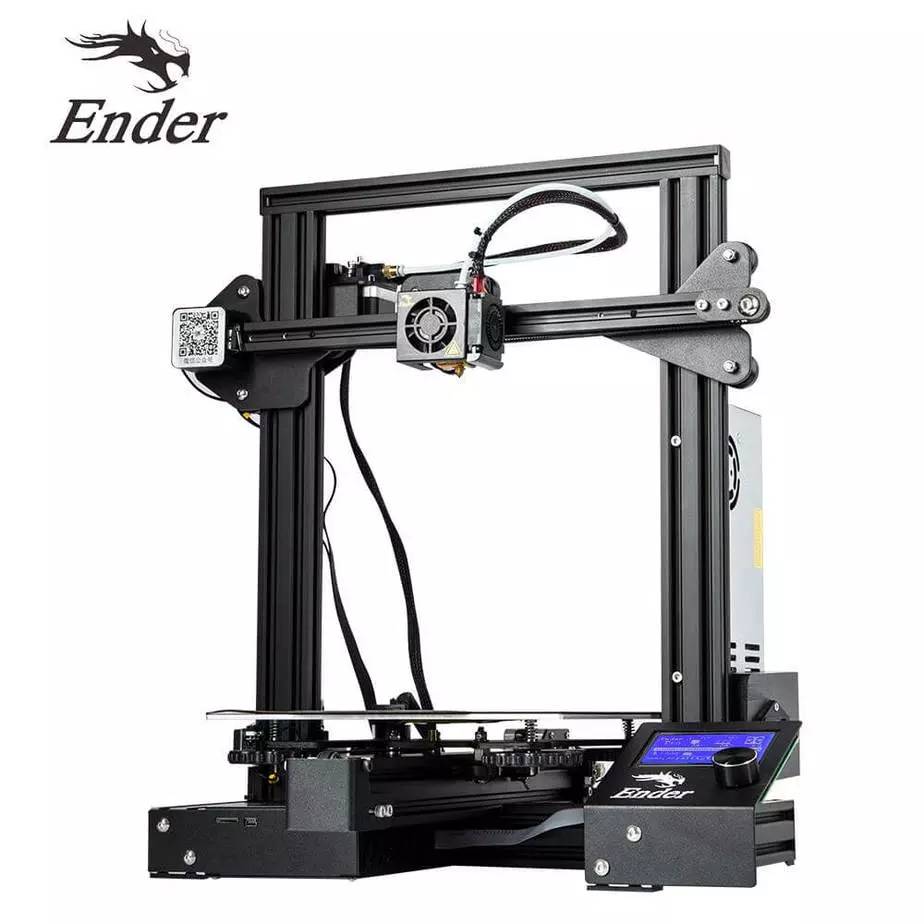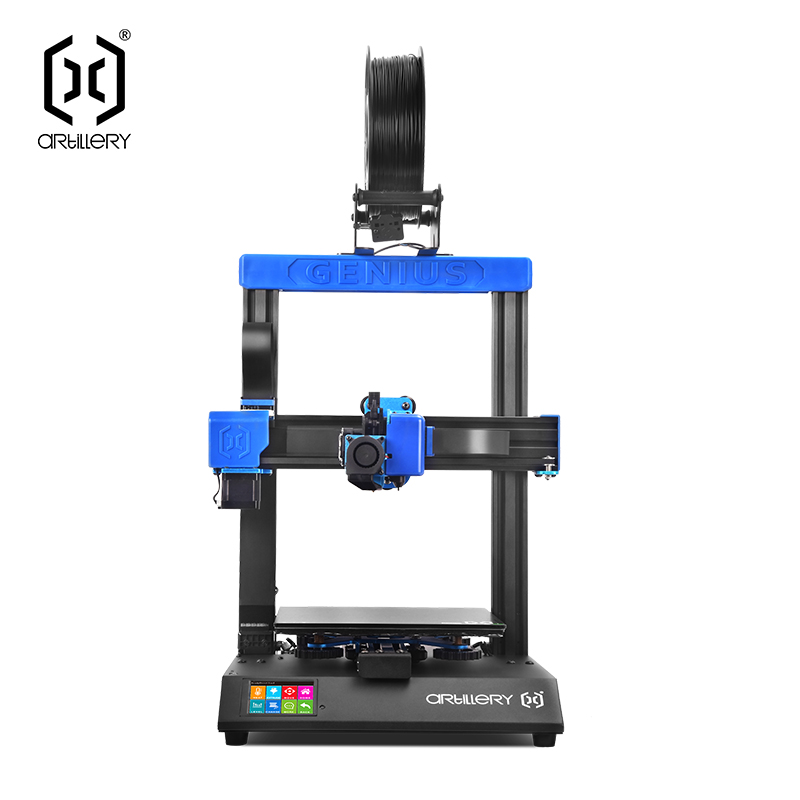Compare Ender 3 vs Ender 3 PRO vs Genius Pro
Comparison between the best 3D printers
Choose the best 3D printer at the best price. The cheapest 3D printers are here.
Buy a 3D printer here with 3D Fila.
 |
 |
 |
|
| Model | Ender 3[BUY Ender 3] |
Ender 3 PRO[BUY Ender 3 PRO] |
Genius Pro[BUY Genius Pro] |
| Printing Material | Filament | Filament | Filament |
| Estimated price | $210,00 | $258,00 | $309,00 |
| Fabricante | Creality 3D | Creality 3D | Artillery |
| Release Year | 2018 | 2019 | 2022 |
| Print Volume [mm] | 220x220x250 | 220x220x250 | 220x220x250 |
| Printer Size [mm] | 440x440x465 | 440x440x465 | 430x390x590 |
| Weight [kg] | 6,62 | 6,62 | 9,6 |
| Power Loss Recovery | NO | NO | YES |
| Enclosed printer | NO | NO | NO |
| Bed Leveling | Manual | Manual | Automatic |
| Filament End Sensor | NO | NO | YES |
| Bed type | Heated | Heated | Heated |
| Power supply system | Bowden | Bowden | Direct Drive |
| Standard nozzle | 0,4 | 0,4 | 0,4 |
| Maximum Nozzle Temperature [°C] | 255 | 255 | 240 |
| Maximum Bed Temperature [°C] | 110 | 110 | 120 |
| Maximum printing speed [mm/s] | 180 | 180 | 150 |
| Filament holder | YES | YES | YES |
| Camera for supervision | NO | NO | NO |
| Recommended filaments | PLA, TPU, ABS, PETG | PLA, TPU, ABS, PETG | PLA, PETG, Tritan, Flex, ABS |
| Recommended slicers | Cura, Simplify, Slic3r | Cura, Simplify, Slic3r | Cura, Simplify, Slic3r, IdeaMaker |
| Maximum Resolution [mm] | 0,1 | 0,1 | 0,1 |
| Processor | 8 bits | 32 bits | Ruby 32bit |
| Display | Mono | Mono | Touchscreen TFT 3,5'' |
| Power Supply | 24V / 270W | 24V / 360W Meanwell | |
| Connectivity | SD / USB | SD / USB | SD / USB |
| Operating systems | Windows, Mac, Linux | Windows, Mac, Linux | Windows, Mac, Linux |
| Date of registration in the system | 2021-04-13 | 2021-04-14 | 2022-11-07 |
| Release date | 2018 | 2019 | 2022 |
| Extra features | The Ender 3 V1 is a DIY assembly 3D printer, a sales leader since 2017, standing out for its cost-benefit. With a wide printing capacity, it has a CNC machined structure for precision and stability. It offers high-precision prints with low noise, thanks to its innovative V-profile and pulleys. It has a self-adhesive magnetic platform for easy removal of models and excellent adhesion. The Ender 3 heats up quickly, reaching 100°C in 5 minutes, ideal for agile prints. It includes protection against power failures, allowing you to resume printing after interruptions, saving time and material. | The Ender 3 Pro stands out for its beginner-friendly assembly and easily modifiable structure. With a 350W power supply, it heats up quickly and has a simple application that offers good print quality. However, its motors and fans are noisy, and the interface seems outdated. Assembly is accessible, without the need for advanced techniques, and it has integrated belt tensioners. It includes a detailed guide and supports microSD card and USB. | The Artillery Genius Pro is a standout 3D printer with a fast-heating AC tempered glass print bed and a sleek design with a black aluminum base and blue accents. It features a Titan-style direct extruder and a 32-bit Ruby mainboard. Despite its advanced feature set, it struggles to maintain print quality, requiring frequent adjustments and calibrations, and its glued glass bed makes cleaning and replacement difficult. |
| Support for multiple colors and materials (AMS and CFS) | NO | NO | NO |
Notes * |
|||
| Cost-benefit | 6 / 10 | 6 / 10 | 7 / 10 |
| Hardware | 0.5 / 10 | 0.5 / 10 | 2.8 / 10 |
| Screen | . | . | . |
| Print volume | 3 / 10 | 3 / 10 | 3 / 10 |
| Performance | 1 / 10 | 1 / 10 | 1 / 10 |
| [BUY Ender 3] | [BUY Ender 3 PRO] | [BUY Genius Pro] |
Conclusion |
| In comparing the three 3D printers—Ender 3, Ender 3 Pro, and Genius Pro—it's evident that each model caters to different user needs and preferences. The **Ender 3** stands out as a budget-friendly option with a strong reputation for reliability and print quality, making it ideal for beginners looking to enter the world of 3D printing without a significant financial commitment. Its simple assembly process and solid build quality make it an attractive choice for users who want dependable results at an economical price. The **Ender 3 Pro** builds on the strengths of its predecessor with improvements such as an enhanced power supply and better structural features that lend themselves to easier upgrades. However, it maintains the same print volume and does not introduce significant new technologies compared to the original Ender 3. This model appeals to users who may want marginal enhancements and ease of use while still staying within a reasonable budget. On the other hand, the **Genius Pro** caters to users who are looking for more advanced features such as automatic bed leveling and a direct drive extruder, which can improve material handling and print quality. Though it comes at a higher price, it offers a contemporary design and updated technology that might attract more experienced users or those seeking specific features for advanced prints. However, its tendency to require frequent adjustments might deter some users. Ultimately, if cost is a primary concern, the **Ender 3** offers the best value while still providing satisfactory performance. For those willing to invest a bit more for slightly better functionality, the **Ender 3 Pro** could be the right fit. Conversely, the **Genius Pro** is better suited for users ready to spend more for advanced features, even though its occasional print quality issues could be a drawback. In conclusion, choosing between these three printers boils down to budget and user experience preference—whether seeking an entry-level model, a slightly upgraded version, or a feature-rich device for more complex projects. |

